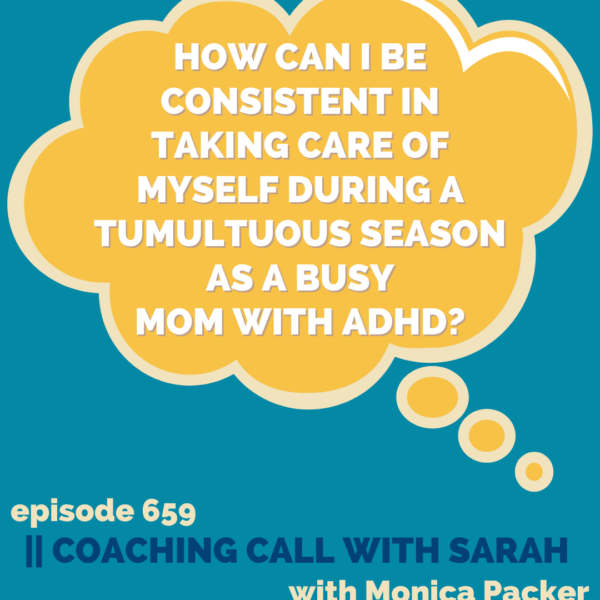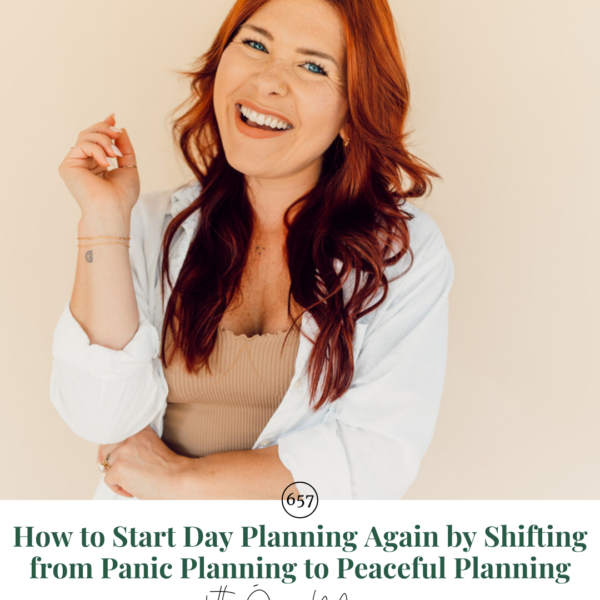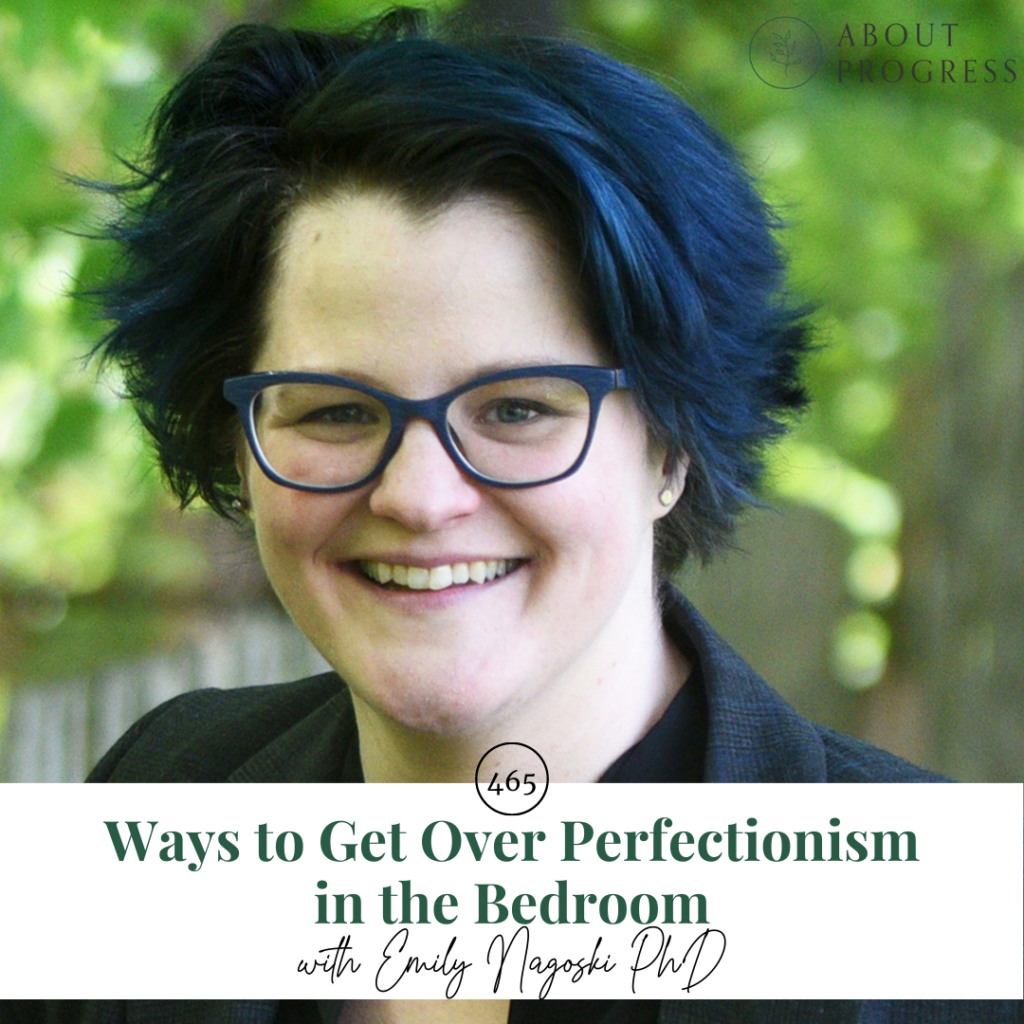
Quick disclaimer! While not explicit, the topic we are covering today is adult in nature. Those who typically listen with kids around may consider putting in earbuds instead. Over the last 6+ years talking about perfectionism on this blog and podcast we have covered intimacy, but never specifically this topic. Today’s episode address the ways that perfectionism interferes with, and even sabotages, the way you show up to, and experience, sex.
This is not an interview meant to make you feel uncomfortable and discouraged, but it will help you examine your behavior and give you some things to try if you want to get more comfortable with your sexuality. After reading her illuminating book, Come As You Are, I was determine to have this author on the podcast. A few years later, we finally get to learn from our expert guest Emily Nagoski PhD, a sex therapist, who specializes in teaching women to live with confidence and joy inside their bodies.
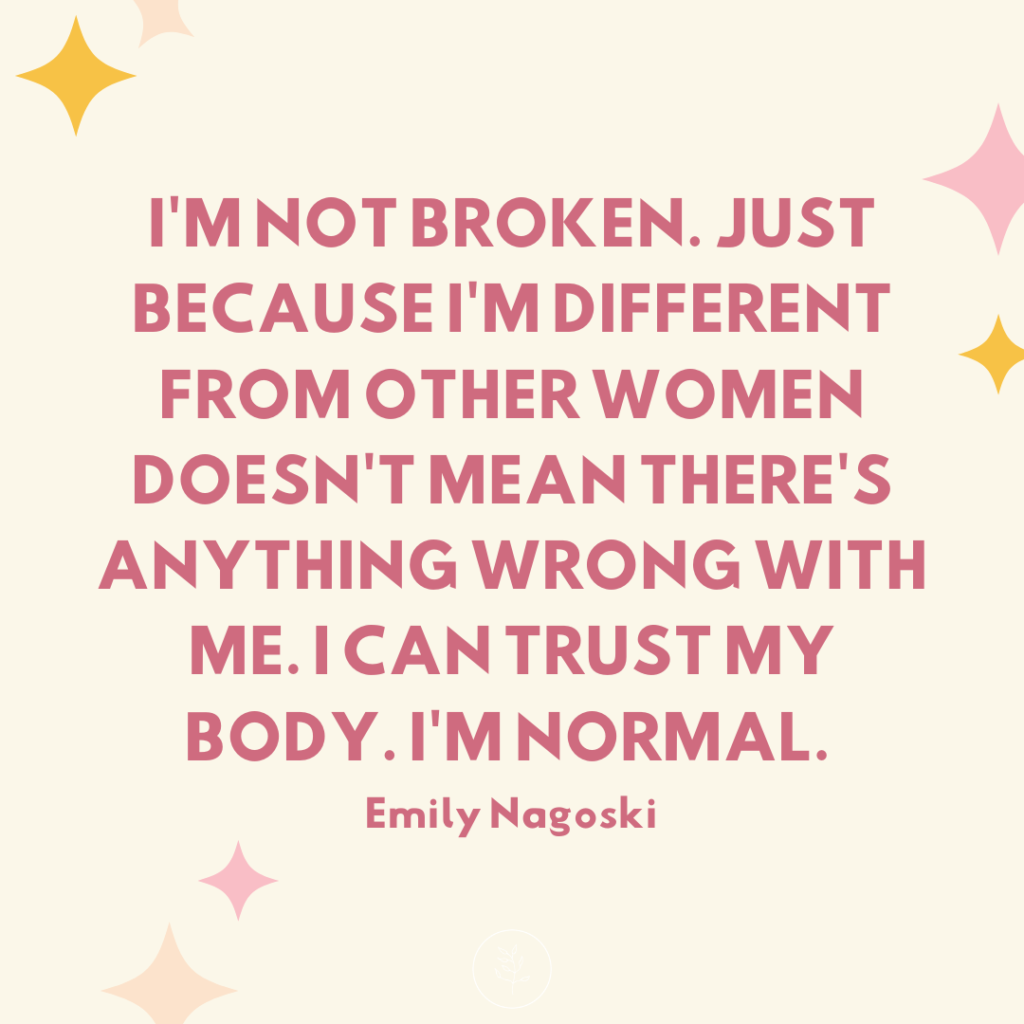



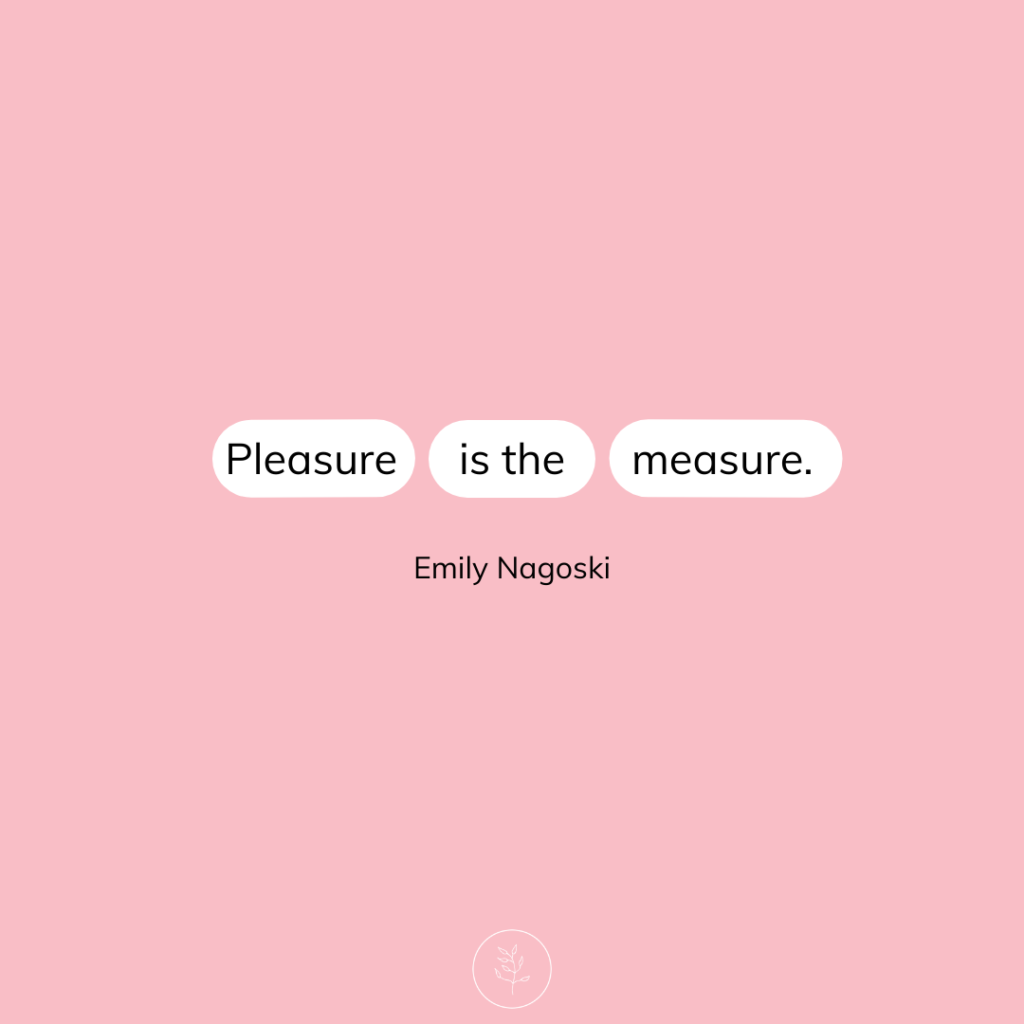
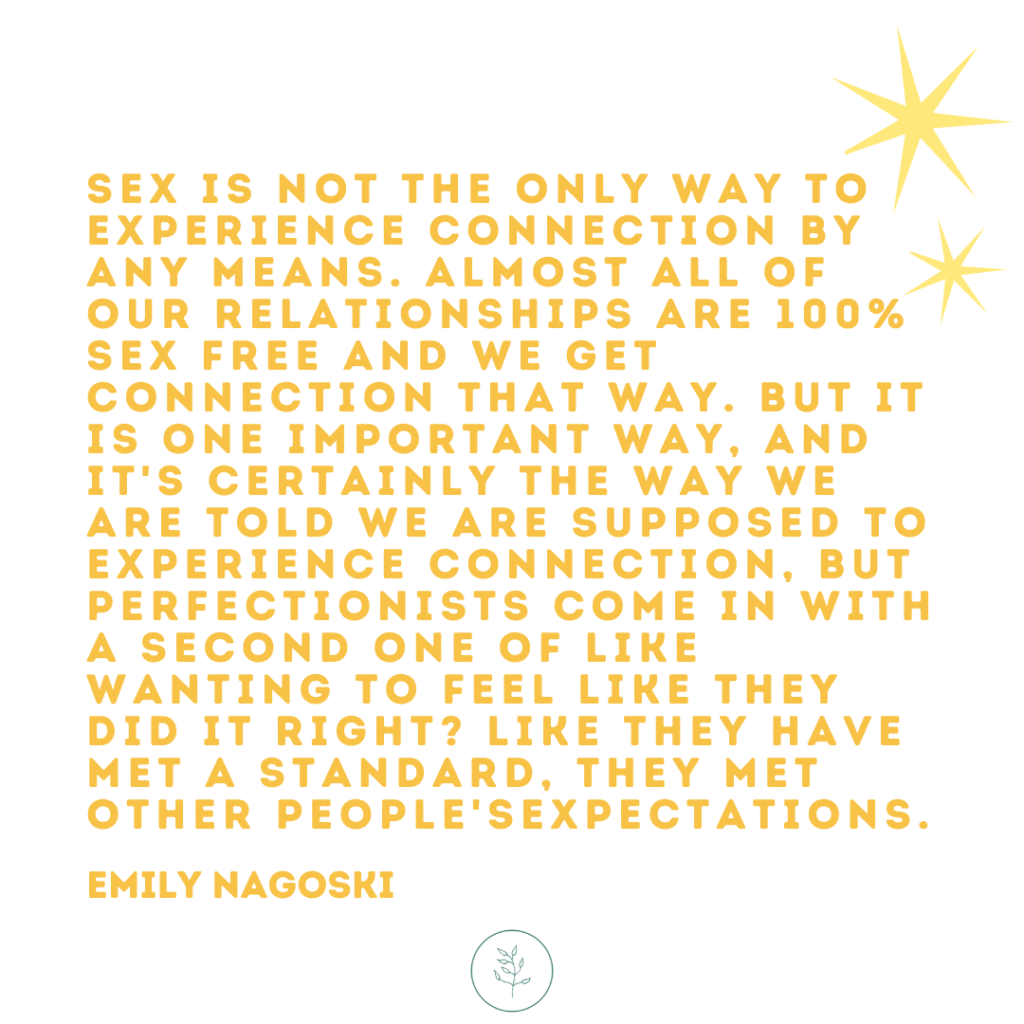
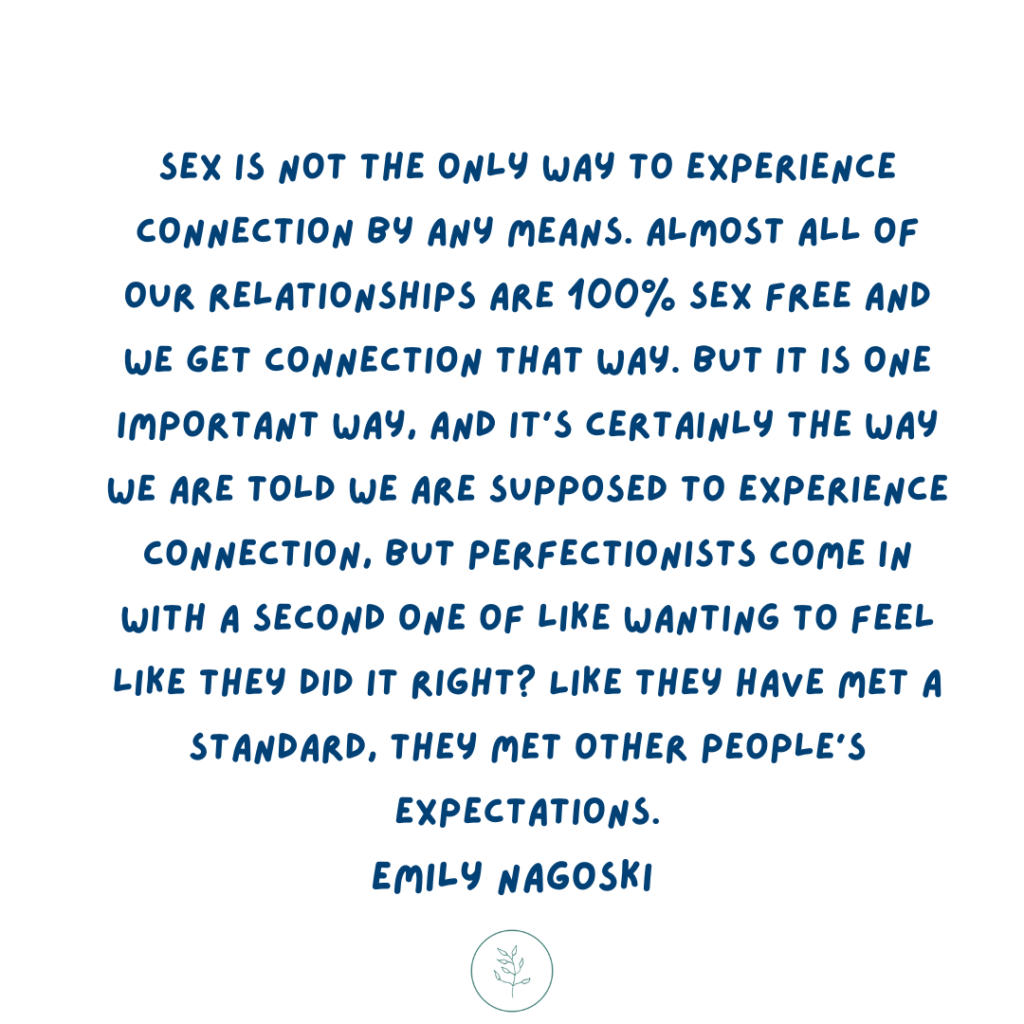

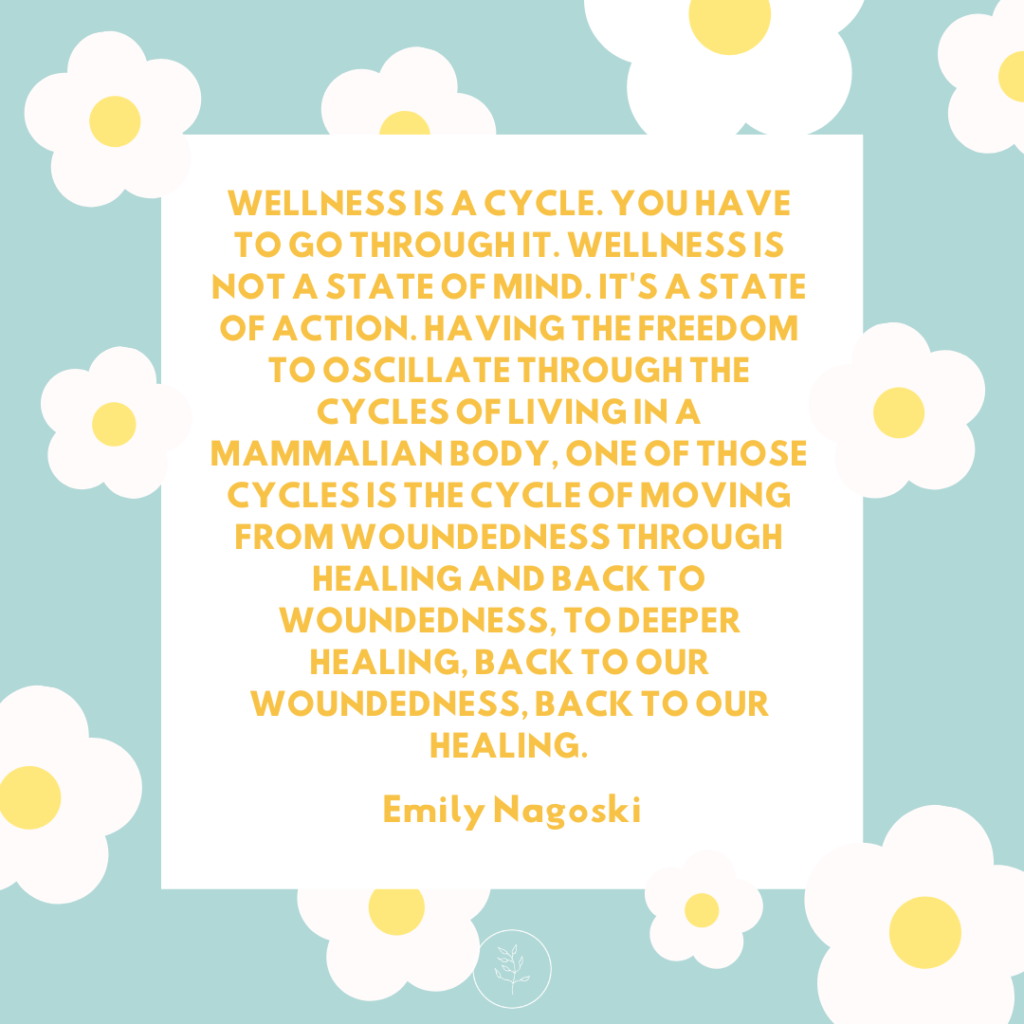
About a few other things…
Do you struggle to create habits that stick? It’s not your fault. The truth is simple: you’ve been trying to form habits using methods designed for perfect robots–not real women living real lives. It’s time to change that. If I could help you gain confidence in creating habits AND guide you to uncover the ONE supportive habit to deeply care for yourself, could you commit 21 days to learning this method? The Sticky Habit Method is a 21-day course that revolutionizes the habit-formation process. It’s real habits for real women.
Sign up for the Go Getter Newsletter to get Progress Pointers in your inbox every Tuesday.
This episode is brought to you by EveryPlate. Visit everyplate.com/podcast and use code progress149 for $1.49 per meal.
You can listen the episode below, or on Apple Podcasts/iTunes, Spotify, Youtube, Overcast, Stitcher, Pocketcasts, or search for “About Progress” wherever you get your podcasts. If you like the show please share it, subscribe, and leave a review!!
SHOW NOTES
My interview with Emily’s twin sister, Amelia
Try me FREE Class and check out my NEW Habit Course
Leave a rating and review for the podcast!
Lend your voice and experience + be featured on the show HERE
Join Monica on Facebook and Instagram
Songs Credit: Pleasant Pictures Music Club
TRANSCRIPT
Monica: Emily Nagoski, it is such an honor to have you on about
Emily: it’s It’s an honor to be here.
Monica: And I was telling you off the air, but truly your book changed so much for me. Starting with that, it just helped me feel normal. And I mean, why it helped me feel normal is because you helped us see like none of us are quote unquote normal. There’s not like a standard for normalcy when it comes in the bedroom.
And we are speaking to women today who maybe do not realize that perfectionism is showing up in the bedroom in ways that are at, at a very best case scenario, not helpful, and very worst case scenario, really damaging. Before we dig in though, I wanna go back to your book, Come As You Are and just ask you why did you write this book?
Emily: So I was a sex educator. I had been for a long time. I was teaching a class called Women’s Sexuality at Smith College, which is the alma mater of Gloria Steinem and Betty Fredan, and my favorite Julia Child.
So
Monica: I didn’t know Julia Child.
Emily: yeah, high achieving, ambitious, driven students who want to know everything and also, because they’re so high achieving, they come in with a little bit of like, I already know kind of a lot. So my challenge was to teach them about sexuality in a way where they learn a whole bunch and I change how they think about sexuality.
So I’m teaching this class and it was a lot, like I shoehorned in all the science I could. And at the end of this big semester, I asked my students, the last question on the final exam was just tell me one important thing you learned. And I thought they were gonna mention some specific, like, the dual control model was helpful for me, or attachment theory, arousal, non concordance.
And instead, more than half of my 187 high achieving driven social justice oriented students wrote something like, I’m normal.
Monica: Really?
Emily: normal. I’m not broken. Just because I’m different from other women doesn’t mean there’s anything wrong with me. I can trust my body. I’m normal. I dunno how much time you spent grading final exams, but it’s not usually like this.
I was in my office grading with tears in my eyes, feeling like something really important had happened in my classroom that semester and I wanted to do it again. And I wanted to do it on a larger scale. And that’s the day I decided to write come as you are.
Monica: I didn’t, that background story just, I mean, of course it lines up with my own experience, but just the bigger purpose that lends to your work is, it’s so nice to see it, isn’t it for yourself even.
Emily: for to have this like moment where I’ve got a pile of papers, 187 final exams that I’m grading, and just overwhelmingly the feedback is not just I learned the material, but that now I have a different relationship with who I am as a sexual person.
Monica: Mm-hmm.
Emily: That’s the kind of thing that lasts way beyond finishing the degree
Monica: Mm-hmm. And that’s what even reading your book has done for me. This work continues in many other ways and we’re gonna chat about that. But let’s, let’s begin talking about perfectionism in, in the bedroom. And, you know, I was curious how common of an issue it is for women. I mean, I think we can just think maybe only a particular type or,
Emily: No.
Monica: maybe in particular ways, but you know, how common is, is it, and why?
Why do we deal with perfectionism in the bedroom?
Emily: I think it’s actually more common in terms of women’s sexual functioning than in a lot of other domains because we have been lied to about how sex is supposed to work in our bodies from the very beginning. My training education experience as a sex educator is remembering being, having it forced upon me to remember that everything I was taught about sexuality up to the age of 18 was untrue.
Often not merely untrue, but actively damaging and aggressively telling me that I was broken and. . And the worst part about it is that these messages are inherently contradictory. So on the one hand, so I have an identical twin sister, you’ve met Amelia. By the time we got to high school, I had in my head a model for how a woman was supposed to be sexual as a person, and it was the romance novel glamour magazine model.
I remember reading an article that was like, men really like it when women make noise in bed and touch their own breasts and appear to enjoy sex. And so like when I started having sex, I did that. I performed pleasure for my partner, not because I was experiencing pleasure in my body, but because I was taught that the way to be a good right sexual woman was to show my partner my pleasure.
Monica: yeah. Play a part.
Emily: If I wasn’t, even if I wasn’t feeling it
Monica: Mm-hmm.
Emily: nobody ever taught me how to recognize pleasure in my body. That such a problem that we can talk about. But Amelia, my identical twin sister. Raised in the same household. By the time she got to high school she had the other script in her head that good girls had no sexual interest or impulses.
They only did it for their partner satisfaction. And bad girls were the ones who experienced any sort of sexual desire. And of course, the two of us never talked about it because we never talk about it. And both of us had to go through a process of unlearning.
Monica: Hmm.
Emily: These completely different scripts in order to find out who we actually are as sexual people. So it sort of doesn’t matter what you’re doing, there’s someone who’s gonna tell you you’re doing it wrong,
Monica: Yeah.
Emily: which is why I think the perfectionism shows up so much worse in terms of sexuality because a lot of the times there’s a really clear model of how to do it right? Like what the perfect thing is that you are striving for the sort of fictional idea of who you’re supposed to be.
So if you have an idea of like who you’re supposed to be as a sexual person, you strive to achieve that perfect sexual self. There’s a whole lot of people who are gonna be like, no, no, no. There’s something morally wrong with you just in the fact that you want to be that kind of, you’re, you are failing no matter what
Monica: I’m glad you’re starting here because I think we go right to the self blame. That’s what perfectionists do, right? We like just blame ourselves instead of taking a bigger picture and saying, no, we were set up to fail and we were, and we were set up for it to be impossible on any, any spectrum that you’re looking at this on.
And I also love that you started with identity here of being like that, that framework of who we’re supposed to be as sexual beings and how different that can look for each one of us, that alone is a big foundation to the problems we might be experiencing.
Emily: Yeah. How much sexual desire are you supposed to feel?
Monica: Hmm. You’re right. Even.
Emily: Everybody’s got an answer in their head.
Monica: yeah.
Emily: Everybody’s got a different answer and they might even have like multiple different answers. Like before I’m married I’m supposed to have absolutely zero, and then when I got married I’m supposed to want sex every day.
Monica: Mm-hmm.
Emily: That is not how that works.
Monica: Yeah. Whiplash for sure. Internally and externally. So let’s, let’s help them kind of get some signs to look for, so,
Emily: There’s so much like, I know I just talked about really dark stuff. There are so many solutions, there’s so many answers. There’s so much.
Monica: Okay. Yes. Let’s make sure they know that like we, this is not an episode to, to make you just feel more despair,
Emily: No, you’re gonna feel so much better by the end of this.
Monica: Good. Okay. I already am. So let’s talk about what they can look for. Like how could it possibly be showing up in ways that they might not even know to look for, and maybe even some more obvious ways that they still just need to remind themselves, like, oh, this is what’s going.
Emily: Yeah. Anytime you are worried that you are doing it wrong. Is a moment like if you’re worried that your level of desire is the wrong amount, you want sex too much, you want sex not enough, that like your perfectionism is already diving in, being like you’re supposed to be doing it this way, therefore you’re doing it wrong.
You start to beat the crap outta yourself that already if you’re orgasms, take the wrong amount of time. If your orgasms happen in response to the wrong kind of stimulus. you start beating the crap outta yourself cuz you think there’s something wrong with you in your body. Nope. When you start, when you, when you’re not having orgasms, you start beating yourself up.
When you have been told that something is supposed to be really pleasurable and when you try it, it is not really pleasurable and you start thinking there’s something wrong with you. It is, unless you are experiencing pain, it is never the case that there’s something wrong with you. It is never the case that there’s something wrong with you unless you’re experiencing pain. In which case, talk to a sex positive medical provider.
Monica: That alone was not something I, I was taught. I actually wasn’t even taught, like most things, you know? And I think that’s a lot of my audience actually. But, but just,
Emily: a lot of, yeah, it’s a lot of everybody.
Monica: Yeah. It’s, and that’s what you, you know, when you, you were navigating becoming a sexual being and learning what that is for you and owning it for yourself, those right ways of doing and feeling and looking.
Emily: Mm-hmm.
Monica: are big inhibitors. I mean, can we even start with like the looking piece of it, you know, in terms of how their bodies need to look.
Emily: Yeah. We live in a world where there is one specific model and ideal of how a body is supposed to look, and many of us are taught that unless we conform to the culturally constructed aspirational beauty ideal, we don’t deserve pleasure. We literally have to discipline our bodies to conform to that ideal so that we can even deserve to participate in sexual pleasure so that we can be wanted by our partner, that we are unwanted by our partner if we do not conform to that ideal. And let’s just name it, it is young, thin, white, long, shiny hair, big boobs, narrow hips, flat abdomen,
Monica: Mm-hmm.
Emily: long legs relative to the length of your torso. Like it’s so specific
Monica: It is.
Emily: and it’s almost no one. It’s some people, even the people who are that aren’t allowed to feel like, yeah, I conform to the ideal I can, I get to feel really confident about my body. Cuz the closer you get to the standard, the more specific in detail like, but you need to tone your arms, but you need to tone your abdomen, but you need to get rid of the cellulite on the back of your thigh.
No one ever actually gets permission culturally to love their bodies. And if I can talk about the brain science for just a second. So the thing in your brain that makes sexual response happen, it’s called the dual control model developed in around 1999, 2000 by Eric Janssen and John Bancroft.
They figured out the mechanism has two parts. The dual control model, there’s the sexual accelerator, which responds to all the sex related stimuli. So that’s everything that you see, hear, smell, touch, taste, and everything that you think, believe or imagine, and every sensation that’s happening inside your body. And it sends a turn on signal that many of us are familiar with at the same time.
And in parallel, you have brakes that are noticing all the good reasons not to be turned on right now. That’s everything that you see, hear, smell, touch, taste, everything that you think, believe, or imagine, and all the sensations happening inside your body that your brain interprets as a potential threat and it sends the turn off signal.
So the process of becoming aroused is the dual process of turning on the ons and turning off the offs. And body self-criticism might be the most common thing that hits the brakes, because if you’re thinking about your body while you are trying to engage sexually, does a critical thought about your body like, Ugh, my tummy, or the way my breasts are hanging, or like, what’s going on with my neck and my facial expression that my partner is seeing are all those thoughts activating the accelerator, they’re those are all hitting the brakes.
And when those brakes stay on, it kind of doesn’t matter how much you hit the accelerator, you’re not gonna go anywhere. Because if you try to drive with your foot on the gas pedal and the brake at the same time, I mean, you might get where you wanna go, but it will take a lot more gas, it will be very slow, and everyone’s gonna get frustrated.
Monica: and painful
Emily: Yeah. And literally could result in pain and doing damage to the system. Absolutely.
Monica: and, and you know, going back to your book, that dual control model was one of the, the actual pieces of like what I learned that changed so much to me cuz I realized just how much my brakes were being stomped on, but also how much of that was internalized pressures of not feeling worthy like you, you talked about that.
Just how much of a piece that is us just even feeling worthy of being a sexual being or, you know, worthy of feeling things or worthy of being in a partnership. You know, stuff like that. But yeah,
Emily: Being admired and worshiped sexually and receiving pleasure from another person as opposed to performing to produce pleasure in someone else, that we can be subjects of our own sexual experience, that we deserve that because we are humans on earth.
Monica: Mm-hmm. . . And do you feel like perfectionists more specifically fall into that trap of performative sex?
Emily: Yeah. Cuz if you can’t be that thing and spoiler you, you can’t be that thing. No one is that thing.
Monica: Yeah.
Emily: but you still want to try to pretend like you deserve to be there. You will put on the show, and especially women like we can put on the show, we know how to act.
Monica: Mm.
Emily: these days. When I was growing up, I didn’t have porn as a model for how to act, but like anyone younger than me had porn on the internet to show them what sex looks like. Porn is a whole conversation, but basically like trying to learn how to have sex by watching porn is like trying to learn to drive by watching Nascar. Like it’s not the same. And they’re doing sex in ways that look good on camera as opposed to ways that like truly feel excellent for the people who are having the sex. So a perfectionist is gonna , this is how I do sex, right?
I need to have this shape of body. I need to be flexible in these ways. I need to make these noises at this time. I need to perform these acts on my partner, and I need to be able to like do the stuff that I as a sex educator, I’m like, that’s a cool party trick if you wanna learn to do it.
Try it if you like it. , but people learn like, no, that’s what you’re supposed to do. That’s what you’re supposed to do. That’s how you should do it. That’s what I should be doing, man. The word should. This is a sex educator phrase. Stop should-ing on yourself.
Monica: Yep.
Emily: So when we believe that we’re supposed to be behaving one way and that has nothing to do with our own internal experience. We just go ahead and pretend that acting according to the rules as we believe they are, is enough, that we’ll be doing it right. And it doesn’t matter what our internal experience is.
Doesn’t matter how much we want or like what we are doing, what we want is to be approved of. Is to be accepted rather than to experience. Which is the opposite of how sex works in
Monica: Yeah, it seems like that really gets in the way, you know, and connected to that performative piece and what you just explained there as well is to me, another big should is just that duty bound sex that I think perfectionists often fallen through into, especially because we’re like, we know the targets we’re supposed to hit, you know?
We know like in order to
Emily: Ya, targets you’re supposed to hit right?
Monica: Yeah. And I’m even saying in terms of like a good partner will do it this many times and and I’ll do it for them. It’s always about like meeting a standard in terms of that.
Emily: We’ll have it with this frequency. It will take this long. My partner will be totally convinced that I had an orgasm from this kind of stimulation.
Monica: Yeah, I’m sure it just is like ever growing that list of where the duty comes in.
Emily: One of the questions I ask people in my workshop is, what is it that you want? When you want sex? The answer is not orgasm. So if it’s not orgasm, what is it? And for perfectionists, here’s what I have found. When people self-identify as perfectionists, when they’re asked, what is it you want? When you want?
Everyone’s first answer is connection. It’s a really important.
Monica: yeah.
Emily: Sex is not the only way to experience connection by any means. Almost all of our relationships are 100% sex free and we get connection that way. But it is one important way, and it’s certainly the way we are told we are supposed to experience connection, but perfectionists come in with a second one of like wanting to feel like they did it right?
Like they have met a standard, they met other people’s expectations
Monica: Mm-hmm.
Emily: and to feel like they’re not broken or wrong.
Monica: Yeah.
Emily: It’s this kind of validation, which is when you go back and read Betty Fredan, the, the Feminine Mystique, there’s a whole chapter on how Housewives in the 1950s were very sexually motivated, like they were initiating sex a lot with their very tired husbands because being able to perform sexually was a part of how they knew they were succeeding in their role.
Monica: Not too much has changed that way in in many cultures, I would say.
Emily: Yeah, it comes and goes. But definitely our sexual performance is part of how we are judged as people. And the difficult thing for everyone, but especially for people who feel like they have to be perfect, is that standards imposed from the outside. When you’re perfectionist, you internalize that standard.
Monica: mm-hmm.
Emily: and you beat yourself up when you don’t need it. And the thing is, the standard that we’re taught has nothing to do with how people actually work. , there’s no such thing as a correct number of times per week to have sex. People ask me all the time, but like, how often do couples have sex per week? And if I tell you that number, which I could, that science exists, you could go look it up if you wanted to.
But if I tell you that number, you’re gonna compare yourself. You’re gonna judge yourself against that number. Like if you’re doing it that much or more, you’re gonna be like, cool, I’m doing it right. And if you’re doing it less than that, you’re gonna be like, oh I’m really bailing. What if the people in the research are having sex that often, and at least one of them doesn’t like any of it,
Monica: huh? Yeah.
Emily: is that, is that, is that a sex life that we want for ourselves? This is why the thing I say over and over again is that pleasure is the measure. If you need a standard against which to like assess whether you’re doing it right. It is not how often you do it or where, or with whom or what position, or even how many orgasms you have.
It’s just whether or not you like the sex you are having
Monica: Yeah, I want that needle pointed for every person listening, pleasure is the measure. . Well, let’s speak to that then. Let’s speak to the women who are now, they’re able to recognize better how it’s showing up. And maybe they’re surprised by a lot of this. I mean, I still learned some things and I thought I knew a lot about this whole, this whole
Emily: That keeps happening to me too. I’m like, wow, I really know a lot. And then I learned something and I’m like, oh,
Monica: that gives me a lot of hope. All right, so now let’s speak to the ones who, who would like, who would like to make some progress in this area. What would you suggest where they can.
Emily: So learning what’s actually true about women’s sexuality is a great place to start. So learning about the dual control model and starting to recognize what in your environment what in your context, context is made of two parts. Context is your external circumstances. Yes. And also your internal state.
What is it about your context that activates your accelerators? and what hits your brakes. And when people are struggling with any aspect of sexual response, whether it’s like arousal or desire, or orgasm or pleasure, sometimes it’s because there’s not enough stimulating the accelerator, but most of the time it’s because there’s too much stuff hitting the brakes, and perfectionism inherently hits the brakes.
One of the things that Amelia and I write about in burnout is that perfectionists may not even start on something because they know they can never meet the sort of ideal that they have in their head of what it’s supposed to be. So why bother even getting started on it,
Monica: Mm-hmm.
Emily: which is why you let go of the whole like frequency, body shape, appearance, performance, orgasm, and just replace it with pleasure.
If you like what’s happening, you’re doing it right. There’s a, a sex therapist named Christine Hyde in New Jersey who taught me this metaphor. So if you think about people in long-term relationships, what she says to her couples is imagine that your best friend invites you to a party and you accept cuz it’s your best friend and it’s a party.
But then as the date approaches, you start thinking, I’m gonna have to find childcare,
Monica: Mm.
Emily: There’s gonna be traffic. Am I really gonna feel like putting on my party clothes at the end of a long day? But you know what? You said you could go, so you put on your party clothes and you show up to the party, and what happens then? Most of the time you have fun at the party, right? If you are having fun at the party or doing it right, that’s what counts as perfect. And my thing is there’s no amount of like really hankering to go to a party that will necessarily make the party you show up to a party worth going to. It doesn’t necessarily mean it’s gonna be fun.
Like if you are allergic to the food, you don’t enjoy the music, you don’t necessarily really trust or enjoy the people who are there. There’s no point in like really wanting to go to that party if the party is no fun.
Monica: So it’s a reframing even that like what’s what’s right?
Emily: yeah, understand what’s hitting your accelerator and what’s hitting your brakes. Put pleasure first. Put pleasure at the center of your definition of sexual wellbeing, and everything else will fall into place. Think through for yourself what it is you want, when you want sex, and also what it is you like when you like sex.
Cuz people often give really different answers to those.
Monica: So think through what you want and what you like.
Emily: Yeah. So when you’re anticipating sex and you’re like, I would like to have sex, what is it that you want? Like if sex goes well, what will you have at the end of it? And then when you’re in the experience of engaging sexually, what’s happening that makes it something worth doing right then in that moment?
Not the goal you’re trying to attain, but what makes the experience, the process, something that is worth experie? Another thing is that I, so this is quite normal. I think that we are taught that there’s a sort of linear scale that goes from being broken to being normal. To being perfect. We think that being normal is sort of like the gateway to being ideal, to being perfect, to being everything, and that is just like that whole dynamic is no.
Instead we are all. in a cycle. And this is another thing I talk about a lot in burnout is that like wellness is a cycle. You have to go through it. Wellness is not a state of mind. It’s a state of action. Having the freedom to oscillate through the cycles of living in a mammalian body, one of those cycles is the cycle of moving from woundedness through healing and back to woundedness, to deeper healing, back to our woundedness, back to our healing.
And when I talk about woundedness, sometimes I’m talking actual literal survivorship of violence, trauma, neglect, abuse, and sometimes I’m just talking about the fact that we are raised in a sex negative patriarchy that insists that we perform our sexuality in order to be acceptable in very specific ways.
The couples who sustain a strong sexual connection over multiple decades are not the couples who constantly want to have wild, adventurous sex. They are really simple things. They’re friends, right? They have a strong foundation of trust and admiration.
They prioritize sex. They decide that it matters for themself and for their relationship that they do this. Let’s face it, pretty silly thing that humans do like sex is inherently absurd. It is wacky. There should be laughter.
Because it’s play, it’s a form of play. So friends, prioritize sex, and the third characteristic of these couples is that they dismantle the gender binary in themselves and in their relationship. They don’t try to perform to somebody else’s rules about who they’re supposed to be and what they’re supposed to like.
Monica: Hmm. That’s huge.
Emily: It’s, yeah, I’ve said it in one sentence, like it’s just a thing you do, but it’s a thing you spend your entire life. Over and over.
Monica: And that’s part of that cycle too,
Emily: Yeah. Because the deal is we live in a world that reinforces our conformity. And so like we do all this big internal work, we talk with our partner about like how we wanna be liberated from the idea that we have to look a certain way, that we have to perform a certain way that we’re supposed to be having or having orgasms from vaginal penetration when only like maybe a quarter of people with vaginas are orgasming from vaginal penetration alone, and the remaining two thirds are sometimes rarely or never orgasming from vaginal penetration alone. Like, let’s free ourselves from that script. Let’s free ourselves from the idea that orgasm is supposed to take X amount of time and acknowledge that orgasm takes the time that it takes.
And the more time you spend getting to orgasm, the more time you spend experiencing growing pleasure. That’s great. . And then you got into the world. You read magazines, you watch movies, and all of it is reinforcing the idea that like, you’re supposed to be having orgasms this way and they’re supposed to take this amount of time, and if you’re not doing it, then you were doing it wrong and you need to read this article about how to do it better.
Monica: and that’s when we go back to the cycle.
Emily: And then you’re like,
Monica: to the, well,
Emily: So that, that magazine article is a little wound that is like, it’s not just that one tiny wound. It’s that it like taps into the big, giant old wound it. And, but that little tapping in is actually also place of release. So like that old, like abcess can be drained a little bit through that.
It’s an opportunity, that’s why it’s a cycle through woundedness, back to healing, woundedness to healing. There is no such thing as perfect except that all of us are already perfect. like you’re doing it right,
Monica: And that’s actually what I was just gonna say. Like what this helps me see is if I don’t fix this part of my life overnight, just after listening to this interview, you know, I want them to, to remember what you just said. I’m doing it right. It’s supposed to be part of a larger cycle of coming into myself in, in multiple ways, including as a sexual being.
And it will take time and it will involve cycles of times where it’s working really well. And then times where I get sucked
Emily: Not linear. Yeah, because you’re gonna keep going back to that pattern that we were taught that like the goal is to keep improving, but in reality, our lives are non-linear. , you know, early in the hot and heavy, fallen in love phase, maybe it’s easy to want and like sex. And then like 10 years down the road, maybe a kid or two, the context is different and you’re gonna find yourself in a different place and there’s nothing wrong with the new context. It’s just different. And so your brain’s gonna respond differently and that’s okay. That is normal.
Monica: Beautiful. I would love to hear from your perspective then, what’s on the other side of this? Like have you seen people who like this, you know this, this whole general problem of perfection is in the bedroom, which again, I know is
Emily: There is no other side. You are never done.
Monica: Okay, good. It’s actually great to hear that.
Can you give us some. progress stories in like a woman who, who at least are seeing some movement in it. Yeah.
Emily: Let me start with maybe the most extreme story. I was doing a workshop at Good Vibrations several years ago, and a woman attended because she had like read come as you are and had eventually had her very first orgasm. She told me, she came up and told me the story after the workshop.
The age of which she had her first orgasm was 75.
Monica: Wow.
Emily: And like nobody ever has to have an orgasm. That didn’t have to be something that she chose to pursue for herself, but she wanted to try it and the stars aligned and she learned so much more. A thing happens as we age. Where there’s a sort of split, some people get to the other side of menopause and are like, phew, I never have to worry about sex again.
And other people get to menopause and they’re like, phew. All those standards against which I was judging and assessing myself no longer apply. I can do whatever the heck I want. I can be exactly the person that I am and I don’t have to try and be something that the world thinks I’m supposed to be. And those are the folks whose sexuality.
Expands beyond anything they had ever considered might exist.
Monica: That’s Fascinat.
Emily: So there’s a body of research called the Optimal Sexual Experiences Research led by Peggy Klein Plots. She and Dana Maynard wrote a book called Magnificent Sex where they study people who have self-identify as having extraordinary sex lives and the typical first age at which they experience this extraordinary sex.
Do you wanna.
Monica: 50.
Emily: 55,
Monica: Yeah.
Emily: first experience of extraordinary sex. So if you experience the progress of your life as the letting go of all the lies you were told and the embracing of who you truly are, that’s the path to freedom. That’s what I mean by no longer buying into other people’s narratives of who you’re supposed to be as a sexual person. And when you get rid of that stuff, it creates space inside you for who you actually are and for the pleasure that your body is capable of. There is a tip that I learned from Adrian Marie Brown, poet, activist, organizer author of pleasure activism.
She suggested to me that I try something called pleasure gratitude. It’s a gratitude practice, but it’s specific. At the end of the day, you ask yourself, what pleasure have I experienced today, for which I can be thankful and just every day you think today. Wow, that, that spaghetti bolognese that I cooked, I really, that was such a thrill and a delight to eat that.
Today I got to have sex and my skin touched my partner’s skin, and that felt delicious and connecting. And I am so grateful that I got to experience that. I did this every day for several months, and my whole life changed.
Monica: Wow.
Emily: it was important for me cuz I work from home. I am home all the time and I come outta my office after hours of work and I feel this sort of like ugh feeling.
And as I continued with this gratitude practice for pleasure. It became part of my transition out of my work brain mode into my human being connection mode that I would just start noticing the beautiful things that existed outside of my office. Whether it’s like, oh, there’s a new branch on this plant.
There’s a new leaf unfurling on my Mons Der. Oh. There’s my husband cooking in the kitchen, and he is so, and so nice and that food smells so good, and it just made it so much easier for me to have access to pleasure because I have practiced noticing it and welcoming it into my life. So like I am myself, like I’ve been doing this a long time.
And just in the last year, I have learned a new skill for increasing my access to pleasure, which increases my access to interest in participating in pleasurable experiences.
Monica: So our typical last question is I ask like, what is one small way listeners can get started on what you taught today? . I’m wondering if that’s it, or maybe you had another one in mind.
Emily: I, I mean one I think is really powerful.
Monica: Yeah.
Emily: I do think the body image piece is so important. So, and the activity I suggest for that is the mirror exercise. Which is where you take off all your clothes and you stand in front of a full length mirror. You look at what you see there and you write down everything you see that you like. And the first time you do this, it might be your eyelashes. it might be your ankle bones, , it might be your spirit, cuz you can see that in your eyes, right? And that’s, that’s because you’re seeing your body through the warping cultural lenses of what Amelia calls the bikini industrial complex. But the thing is, you do it again tomorrow, and you do it again the next day and again the next day.
And gradually you’ll begin to be able to see your actual body without those warping lenses with your eyes and recognize it. Freaking freaking miracle that it actually is, that you are already beautiful exactly the way you are, not because beautiful is something we all should be. I don’t mean that we all conform to the cultural ideal.
We don’t, but we are beautiful the way every tree is beautiful, the way every dog is beautiful. If you can look out at the weather on any given day, and a tree is beautiful in the fall, and a tree is beautiful in the spring, and a tree is beautiful in winter. You know that you are already beautiful exactly as you are.
Monica: I’m not gonna forget that visual. That was really, really impactful for me. Thank
Emily: Oh.
Monica: Emily, let’s direct people to your amazing book. Come As You Are, but also your podcast
Emily: Yes, the come As You Are podcast is brand new and I’m really proud of it and we worked really hard and my lead producer, Mo Labour, is a delightful, spectacular human being that I think is gonna become everyone’s best friend. We answer sex questions with science.
It’s a really simple format but I get to talk about the sex science that I love so much in ways that are like here directly. I’m gonna show you how to apply this to this particular question, and I think people will learn from that. How to apply the science to whatever’s happening in their own particular sex questions.
Monica: You know, I’ve kind of joked from the beginning. I’ve always been as a podcaster, my category. Is part of the Sex podcast. Someone was like, I’m competing with the Sex podcast. Like, who wants to listen to a personal development show? When you’ve got all these sex podcasts, yours is the one I would make an incredible exception for like, because of how central it is, the work that you do to who we are as human beings, which is to me a lot of the missing piece of
Emily: That’s secret. Don’t tell. No, it’s just about sex. It’s just about how to have orgasms and increase your desire. It’s not actually about like how to like enjoy who you are as a person and be more compassionate and patient with yourself and more loving with your partner and more aware of your boundaries.
It’s, it’s, it’s just about sex. That’s all. It’s not. It’s about how to make the world a better
Monica: Yes. Yeah, yeah. I, I got it. But let’s make sure the people who can’t see in the faces. But, but yeah, that’s, that’s, that’s why your work has been so instrumental to me and many, many, many others. So you’ve got an avid listener here, and I hope the people listening will go and I’m subscribed right away.
Thank you so much for your work and for being here today,
Emily: thank you so much. It’s been a pleasure. Pleasure. See what I did there? .
Monica: Okay. Okay. All right. I’m recording. Oh, I also edit, so don’t I. If you need to start a sentence over anything like that, just
Emily: so if I mess up this, sometimes I begin a sentence and then I forget what the beginning was by the time I get to the end
Monica: That’s okay.
Emily: I’m just like, can I start that sentence over again?
Monica: we can totally do that. No problem at all. All right, let’s, let’s get started.
